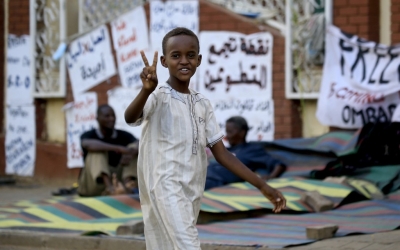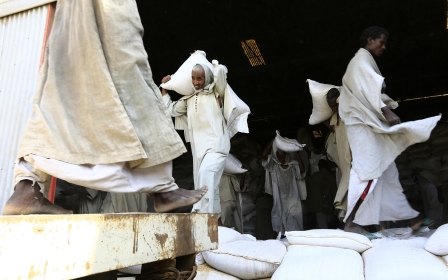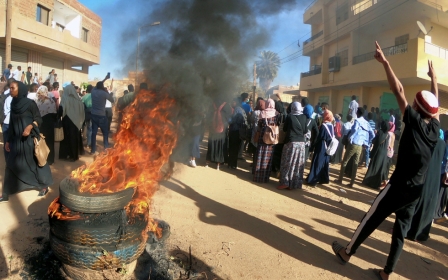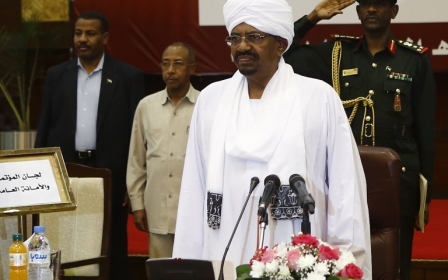Sudanese professors arrested in Khartoum as protests continue
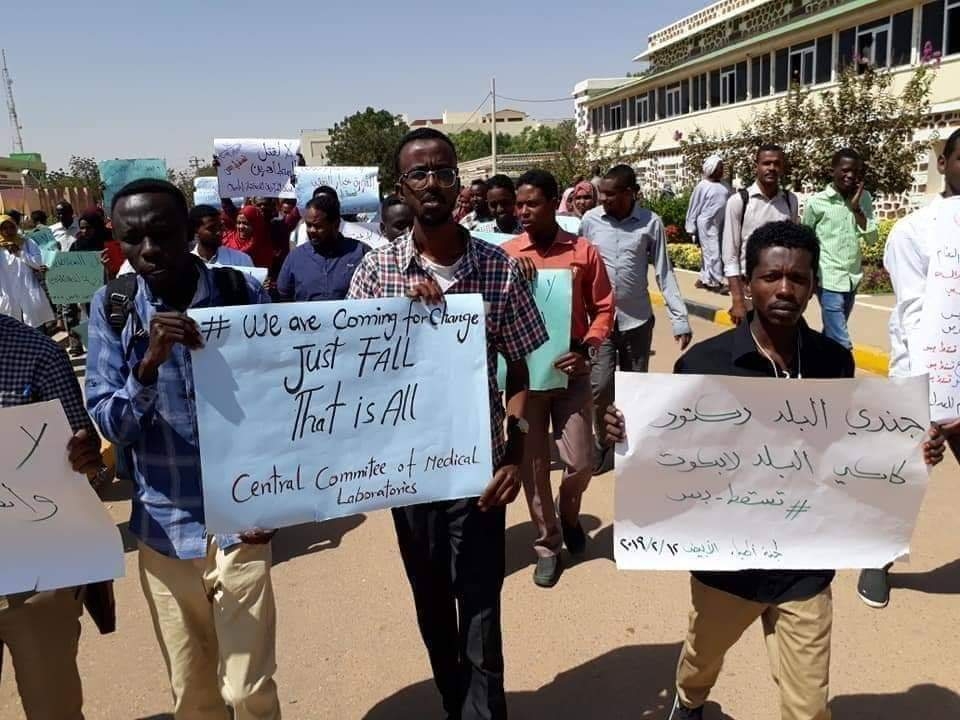
Sudan's security forces have arrested more than a dozen professors who were staging a protest at Khartoum University, as mass demonstrations against the Sudanese government continue, Al-Araby Al-Jadeed first reported.
The Sudanese professors, carrying placards that read, "The solution is for the president to step down from power," marched down the main street in the capital on Tuesday.
Security forces arrested a group of 19 academics, Al-Araby Al-Jadeed said, while Reuters and AFP news agencies put the number of professors arrested at 14.
"Fourteen professors, eight from University of Khartoum and six from other universities, were on their way to take part in the sit-in when security agents took them away," Mamdouh Mohamed Hassan, from the University of Khartoum, told AFP.
Why are Sudanese protesting against their government?
+ Show - HideSudanese protests have evolved in the space of less than six months from complaints about bread prices to calls for long-term leader Omar al-Bashir to go and demands for a civilian-led transition to democracy.
Here's a summary of the key moments so far since the protests began.
19 December 2018: People take to the streets in the city of Atbara to protest against a government decision to triple the price of bread, torching a local ruling party office. By the next day protesters on the streets of Khartoum and other cities calling for "freedom, peace, justice". Police try to disperse the crowds, resulting in at least eight deaths. Dozens more will be killed in the weeks of protest that follow
22 February 2019: Sudanese President Omar al-Bashir declares a nationwide state of emergency. He swears in a new prime minister two days later, as riot police confront hundreds of protesters calling for him to resign
6 April: Thousands gather outside the army's headquarters in Khartoum, chanting "one army, one people" in a plea for the military's support. They defy attempts by state security forces to dislodge them and troops intervene to protect them
11 April: Military authorities announce they have removed Bashir and that a transitional military council will govern for two years. Despite celebrations at Bashir's demise, protest leaders denounce the move as a "coup" and the protesters remain camped outside army headquarters.
14 April: Protest leaders call on the military council to transfer power to a civilian government
20 April: Sudan's military rulers hold a first round of talks with protest leaders
27 April: The two sides agree to establish a joint civilian-military ruling council, but talks stall over differences in the composition of the council, with both sides demanding a a majority
15 May: With negotiators reported to be close to agreeing a three-year transition to civilian rule, military leaders suspend talks and insist protesters remove barricades outside the army's headquarters. Talks resume on 19 May but break down again on 20 May, with the opposition insistent that a civilian must head the transitional governing body
28 May: Thousands of workers begin a two-day strike to pressure the military rulers and call for civilian government
3 June: At least 35 people killed and hundreds injured, according to opposition-aligned doctors, as security forces firing live ammunition move to disperse the protest camp outside army headquarters
4 June: General Abdel Fattah al-Burhan, the head of the military council, announces that all previous agreements with protest leaders are scrapped and says elections will be held in nine months
Several other professors were also unable to participate in the sit-in after security agents closed the gates of the venue where they had gathered before heading out, the news agency reported.
New MEE newsletter: Jerusalem Dispatch
Sign up to get the latest insights and analysis on Israel-Palestine, alongside Turkey Unpacked and other MEE newsletters
Sudanese doctors and pharmacists also protested in front of the private hospitals in several cities on Tuesday.
The protests, which first erupted on 19 December and have taken place daily across the country, are led by the Sudanese Professionals Association, an umbrella group of doctors, engineers, teachers and other professionals.
While they started as a result of anger over the rising cost of bread, the demonstrations swiftly morphed into a widespread call for the resignation of Sudanese President Omar al-Bashir.
With a central slogan of "Fall, that's all," the anti-government protests have been described as one of the most significant threats to Bashir’s 30-year rule.
Over 1,000 people, including opposition leaders, activists, protesters and journalists, have been arrested since the protests broke out.
Rights groups say that more than 51 people have been killed in the protests, though Sudanese officials put that number at 31.
Last week, Bashir linked the protests to Sudan’s decades-old public order law, which activists say mainly targets women, often through accusations of "indecent dressing and immoral behaviour".
Bashir also acknowledged the economic hardship many Sudanese face.
He has so far resisted the calls to step down, saying that change can only come through the ballot box and blaming the unrest on unnamed foreign powers.
But he and some senior officials have adopted a more conciliatory tone in recent weeks and promised to free detained protesters.
Middle East Eye delivers independent and unrivalled coverage and analysis of the Middle East, North Africa and beyond. To learn more about republishing this content and the associated fees, please fill out this form. More about MEE can be found here.


